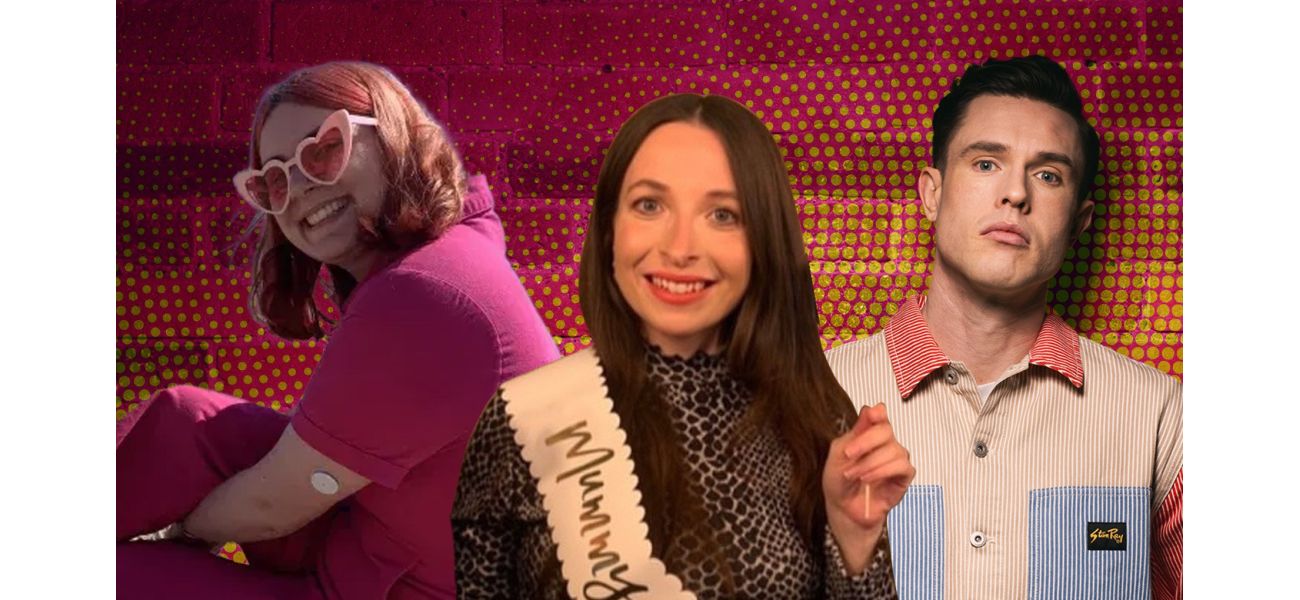We all have an unseen health issue and are blamed for it.
Life is full of unexpected twists and turns, even in the present.
November 30th 2024.

Living with diabetes can be a challenging experience, especially when it comes in different forms. As for the three of us, we each have our own journey with this condition. For me, it all began almost 10 years ago when I suddenly fell ill with an unknown sickness. At the age of 17, I had always been in good health and barely ever visited the doctor's office during my childhood.
But within a matter of weeks, everything changed. I went from being a healthy teenager to someone who could barely find enough energy to make it through the day. The extreme fatigue, constant thirst, and body aches made it difficult for me to function. I tried to blame it on the stress of studying for my A Levels, but deep down I knew something was wrong.
It wasn't until a friend pointed out my weight loss that I truly realized the severity of my symptoms. They asked me what diet I was on, and it all clicked into place. In 2025, it will mark 10 years since my diagnosis of type 1 diabetes. It took almost six months for me to receive a proper diagnosis, as my symptoms seemed to worsen every day. Looking back, I referred to it as a "mystery illness" because I couldn't seem to find a clear answer.
I remember my mom being the one to finally recognize what was happening to me. She had a friend who was diagnosed with type 1 after experiencing similar symptoms on a school trip. She marched me into the doctor's office and demanded they test my blood sugar levels. The results were alarming, and I was immediately sent to the hospital. The specialist told me that if I had waited any longer, I might not have survived.
The initial period after my diagnosis was a difficult adjustment, as I had to learn how to manage an entirely new condition. But I quickly realized that I wasn't alone in this journey. Ryder Rickhards, who was diagnosed with type 1 at the age of 10, shares a similar experience. His brother was also diagnosed with type 1, so their family was familiar with the warning signs. Ryder recalls getting a lot of time off from school and receiving support from his friends. Though it was a relief to have a diagnosis and start receiving insulin, he also struggled with remembering to take his medication and managing his diabetes while at university.
Like Ryder, I also wear a glucose monitor to track my blood sugar levels. It has been a game-changer in terms of managing my diabetes. Despite the challenges, Ryder sees his diabetes as something he can't change and has made him mentally stronger and more organized. Though he often receives ignorant comments from strangers, he has learned to be more open about his condition and educate others about the differences between type 1 and other forms of diabetes.
Visibility and awareness are crucial when it comes to type 1 diabetes. Many celebrities, such as model Lila Moss and musician Este Haim, have been open about their condition, bringing more attention to it. Comedian Ed Gamble, who was diagnosed at the age of 13, credits his mom, who was a nurse, for recognizing the signs and getting him diagnosed quickly. He also acknowledges that not everyone has a smooth diagnosis story, and it's important to be aware of the symptoms.
As per the NHS website, type 1 diabetes is caused by the body's inability to produce insulin, which controls blood sugar levels. This means that those with type 1 diabetes have to constantly monitor their blood sugar levels and administer insulin either through injections or an insulin pump. It's a continuous process, as they also need to count carbohydrates and adjust their insulin accordingly.
It's worth noting that type 1 diabetes is not related to diet or lifestyle choices, and there is currently no cure. Ed admits that it took him years to fully understand and accept his condition, as it's a constant learning process. But he believes that it has made him mentally stronger and encourages others to learn from their experiences with type 1 diabetes.
Living with diabetes can be a challenging and life-changing experience. Three of us share a common bond of living with different forms of diabetes. Ten years ago, I was struck with a mysterious illness that left me feeling drained and exhausted. At the young age of 17, I had always been in good health and had never even stepped foot in a doctor's office. But suddenly, everything changed. I went from being an energetic teenager to one who could barely make it through the day. I was struggling with extreme fatigue, constant thirst, and body aches. I tried to brush it off as just the stress of studying for my A Levels, but deep down, I knew something was wrong.
It wasn't until a friend commented on my appearance that I realized something was seriously wrong. They noticed that I had lost a significant amount of weight and asked me about my diet. It all clicked for me then. In 2025, it will mark 10 years since my diagnosis. It took almost six months of worsening symptoms before I was finally diagnosed with type 1 diabetes. Looking back, I now understand why I referred to it as a "mystery illness." Despite multiple visits to the doctor, I couldn't seem to find an answer. In fact, a few months prior, I had gone to the doctor for my constant thirst and was misdiagnosed with oral thrush and given medication that did nothing to help.
My mother was the one who finally connected the dots. She remembered a school trip where a friend of hers was diagnosed with type 1 diabetes after experiencing similar symptoms. She took me to the doctor and demanded they test my blood sugar levels. The results were alarming, and I was immediately sent to the hospital. The specialist told me that if I had waited any longer, I might not have survived. The initial period after my diagnosis was overwhelming as I learned how to manage my new condition, but I was not alone.
Ryder Rickhards, now 19 years old, was diagnosed with type 1 diabetes nine years ago at the age of 10. His brother had been diagnosed a decade earlier, so they were familiar with the warning signs. Ryder's family quickly realized what was happening when he did a blood test on his brother's machine. He was grateful for the time off school and the support of his friends, but it wasn't easy. He often forgets to administer his insulin, which means he has to miss out on important events and activities. But he doesn't feel sorry for himself. He sees his diabetes as something he cannot change, and it has made him mentally stronger and more organized.
Unfortunately, Ryder often receives ignorant comments from strangers who assume he must be overweight because he has diabetes. He used to be embarrassed to inject or test his blood sugar in front of others, but now he is open about his condition and happy to answer questions. He wishes that people understood the difference between type 1 and other forms of diabetes. He often sees articles and books that refer to it simply as "diabetes," which can be frustrating.
Visibility is crucial when it comes to type 1 diabetes, and many celebrities have been using their platform to raise awareness. From model Lila Moss wearing her insulin pump on the catwalk to Este Haim doing the same on stage at Glastonbury, these individuals are helping to break the stigma surrounding the condition. Comedian Ed Gamble was diagnosed in 1999 at the age of 13. His mother, a nurse, noticed the symptoms before they became dangerous and took him to the doctor. He considers himself lucky compared to others who have had more traumatic experiences. Even though it took him years to fully understand his condition, he remains positive and sees the diagnosis as a life of surprises and learning experiences.
Type 1 diabetes is a condition in which the body cannot produce insulin, resulting in high levels of glucose in the blood. Those living with type 1 diabetes must constantly monitor their blood sugar levels and administer insulin through injections or an insulin pump. It is not related to diet or lifestyle choices, and the exact causes are unknown. Unfortunately, there is currently no cure, but people like Ed are using their platform to educate others and raise awareness for this often misunderstood condition.
But within a matter of weeks, everything changed. I went from being a healthy teenager to someone who could barely find enough energy to make it through the day. The extreme fatigue, constant thirst, and body aches made it difficult for me to function. I tried to blame it on the stress of studying for my A Levels, but deep down I knew something was wrong.
It wasn't until a friend pointed out my weight loss that I truly realized the severity of my symptoms. They asked me what diet I was on, and it all clicked into place. In 2025, it will mark 10 years since my diagnosis of type 1 diabetes. It took almost six months for me to receive a proper diagnosis, as my symptoms seemed to worsen every day. Looking back, I referred to it as a "mystery illness" because I couldn't seem to find a clear answer.
I remember my mom being the one to finally recognize what was happening to me. She had a friend who was diagnosed with type 1 after experiencing similar symptoms on a school trip. She marched me into the doctor's office and demanded they test my blood sugar levels. The results were alarming, and I was immediately sent to the hospital. The specialist told me that if I had waited any longer, I might not have survived.
The initial period after my diagnosis was a difficult adjustment, as I had to learn how to manage an entirely new condition. But I quickly realized that I wasn't alone in this journey. Ryder Rickhards, who was diagnosed with type 1 at the age of 10, shares a similar experience. His brother was also diagnosed with type 1, so their family was familiar with the warning signs. Ryder recalls getting a lot of time off from school and receiving support from his friends. Though it was a relief to have a diagnosis and start receiving insulin, he also struggled with remembering to take his medication and managing his diabetes while at university.
Like Ryder, I also wear a glucose monitor to track my blood sugar levels. It has been a game-changer in terms of managing my diabetes. Despite the challenges, Ryder sees his diabetes as something he can't change and has made him mentally stronger and more organized. Though he often receives ignorant comments from strangers, he has learned to be more open about his condition and educate others about the differences between type 1 and other forms of diabetes.
Visibility and awareness are crucial when it comes to type 1 diabetes. Many celebrities, such as model Lila Moss and musician Este Haim, have been open about their condition, bringing more attention to it. Comedian Ed Gamble, who was diagnosed at the age of 13, credits his mom, who was a nurse, for recognizing the signs and getting him diagnosed quickly. He also acknowledges that not everyone has a smooth diagnosis story, and it's important to be aware of the symptoms.
As per the NHS website, type 1 diabetes is caused by the body's inability to produce insulin, which controls blood sugar levels. This means that those with type 1 diabetes have to constantly monitor their blood sugar levels and administer insulin either through injections or an insulin pump. It's a continuous process, as they also need to count carbohydrates and adjust their insulin accordingly.
It's worth noting that type 1 diabetes is not related to diet or lifestyle choices, and there is currently no cure. Ed admits that it took him years to fully understand and accept his condition, as it's a constant learning process. But he believes that it has made him mentally stronger and encourages others to learn from their experiences with type 1 diabetes.
Living with diabetes can be a challenging and life-changing experience. Three of us share a common bond of living with different forms of diabetes. Ten years ago, I was struck with a mysterious illness that left me feeling drained and exhausted. At the young age of 17, I had always been in good health and had never even stepped foot in a doctor's office. But suddenly, everything changed. I went from being an energetic teenager to one who could barely make it through the day. I was struggling with extreme fatigue, constant thirst, and body aches. I tried to brush it off as just the stress of studying for my A Levels, but deep down, I knew something was wrong.
It wasn't until a friend commented on my appearance that I realized something was seriously wrong. They noticed that I had lost a significant amount of weight and asked me about my diet. It all clicked for me then. In 2025, it will mark 10 years since my diagnosis. It took almost six months of worsening symptoms before I was finally diagnosed with type 1 diabetes. Looking back, I now understand why I referred to it as a "mystery illness." Despite multiple visits to the doctor, I couldn't seem to find an answer. In fact, a few months prior, I had gone to the doctor for my constant thirst and was misdiagnosed with oral thrush and given medication that did nothing to help.
My mother was the one who finally connected the dots. She remembered a school trip where a friend of hers was diagnosed with type 1 diabetes after experiencing similar symptoms. She took me to the doctor and demanded they test my blood sugar levels. The results were alarming, and I was immediately sent to the hospital. The specialist told me that if I had waited any longer, I might not have survived. The initial period after my diagnosis was overwhelming as I learned how to manage my new condition, but I was not alone.
Ryder Rickhards, now 19 years old, was diagnosed with type 1 diabetes nine years ago at the age of 10. His brother had been diagnosed a decade earlier, so they were familiar with the warning signs. Ryder's family quickly realized what was happening when he did a blood test on his brother's machine. He was grateful for the time off school and the support of his friends, but it wasn't easy. He often forgets to administer his insulin, which means he has to miss out on important events and activities. But he doesn't feel sorry for himself. He sees his diabetes as something he cannot change, and it has made him mentally stronger and more organized.
Unfortunately, Ryder often receives ignorant comments from strangers who assume he must be overweight because he has diabetes. He used to be embarrassed to inject or test his blood sugar in front of others, but now he is open about his condition and happy to answer questions. He wishes that people understood the difference between type 1 and other forms of diabetes. He often sees articles and books that refer to it simply as "diabetes," which can be frustrating.
Visibility is crucial when it comes to type 1 diabetes, and many celebrities have been using their platform to raise awareness. From model Lila Moss wearing her insulin pump on the catwalk to Este Haim doing the same on stage at Glastonbury, these individuals are helping to break the stigma surrounding the condition. Comedian Ed Gamble was diagnosed in 1999 at the age of 13. His mother, a nurse, noticed the symptoms before they became dangerous and took him to the doctor. He considers himself lucky compared to others who have had more traumatic experiences. Even though it took him years to fully understand his condition, he remains positive and sees the diagnosis as a life of surprises and learning experiences.
Type 1 diabetes is a condition in which the body cannot produce insulin, resulting in high levels of glucose in the blood. Those living with type 1 diabetes must constantly monitor their blood sugar levels and administer insulin through injections or an insulin pump. It is not related to diet or lifestyle choices, and the exact causes are unknown. Unfortunately, there is currently no cure, but people like Ed are using their platform to educate others and raise awareness for this often misunderstood condition.
[This article has been trending online recently and has been generated with AI. Your feed is customized.]
[Generative AI is experimental.]
0
0
Submit Comment





